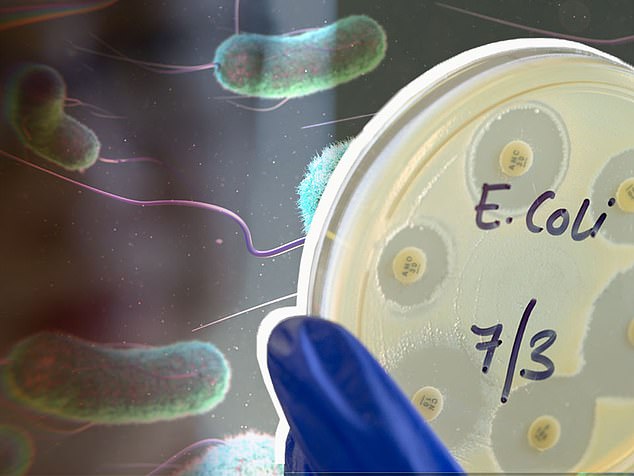Every year in the UK around 2.4million people fall ill with food poisoning that leaves them suffering from vomiting, diarrhoea and crippling stomach cramps.
While the majority make a full recovery within days, there can be long-term health consequences.
In fact, recent evidence suggests exposure to a common cause of food-borne illness – E. coli – may be linked with diseases including bowel cancer, dementia, Parkinson’s, heart disease and even depression.
Specifically, one type of E. coli – E. coli 0157 – which gets inside the body through contaminated food, swimming in polluted water or simply shaking hands with someone who has not washed them properly after going to the loo (it is most commonly found in animal and human waste), can release a deadly toxin called Shiga.
Scientists have known for years that this toxin, which attacks cells in the gut lining, can lead to a rare, but potentially deadly, complication called haemolytic uremic syndrome – where blood vessels in the intestines become so damaged that it leads to kidney failure. The UK Health Security Agency says there were 2,063 confirmed cases of Shiga-related E. coli infections in England in 2022 (the last year figures are available for).
In May last year, one person died and more than 100 were hospitalised after an outbreak of E. coli 0157 across England linked to contaminated salad leaves in supermarket sandwiches.
Most types of E. coli, if swallowed, get destroyed by corrosive acid in our stomachs. But a few – including 0157 – are resistant to its effects and can sneak through the stomach lining into the bloodstream, where effects can be catastrophic and increasingly linked to serious long-term conditions.
In April, research in the journal Nature concluded E. coli infection in childhood could explain why so many under-50s seem to be developing bowel cancer, a disease normally associated with old age.

The UK Health Security Agency says there were 2,063 confirmed cases of Shiga-related E. coli infections in England in 2022

In May last year, one person died and more than 100 were hospitalised after an outbreak of E. coli 0157 across England linked to contaminated salad leaves in supermarket sandwiches
Cancer Research UK data suggest bowel cancer rates in those aged 25 to 49 have jumped by 52 per cent since the early 1990s.
When scientists from the University of California looked at DNA samples from young bowel cancer patients, they found they all had a particular type of genetic abnormality in their digestive tracts that seemed to raise the risk of tumours forming – and concluded the process probably started in childhood, while the body is still developing.
And what’s more, they also had traces of toxins produced by E. coli known to trigger cancer cell growth. What’s not clear yet is why or how more children are exposed to the toxic effects of E. coli than in the past.
‘E. coli is very difficult to avoid – we are exposed to it all the time,’ says Paul Hunter, a professor of medicine at the University of East Anglia, and an expert in microbiology. ‘Most lettuce has small amounts of the bacteria on it. Every time you shake hands with someone, there is a good chance E. coli is transferred between you.
‘Even if you go swimming at the beach, you’re very likely to come into contact with it.’
It’s not just bowel cancer scientists now think may be the result of the bug. Recent studies suggest it may also play a part in the development of dementia. Scientists from the University of Florida, interested in the relationship between the gut and brain, found adults who’d had even a single E. coli 0157 infection were five times more likely to be subsequently diagnosed with Alzheimer’s, the most common type of dementia.
They trawled through the medical records of thousands of patients and found strong links between food poisoning and Alzheimer’s later in life, reported the Journal of Alzheimer’s Disease in 2021.
Another study by the University of California found brain tissue samples from people who died with Alzheimer’s had higher levels of E. coli than those from people who’d died from different causes, reported the journal Neurology in 2016.
But how could a bug that normally causes food poisoning lead to incurable brain decline?

‘E. coli is very difficult to avoid – we are exposed to it all the time,’ says Paul Hunter, a professor of medicine at the University of East Anglia and an expert in microbiology
Studies show some types of E. coli, once inside the body, can produce tiny fibres called curli which can kick-start the build-up of harmful deposits (amyloid plaques) in the brain, a hallmark of Alzheimer’s. It’s thought the fibres trigger an abnormal signalling between cells in the gut and the brain, creating the ideal conditions for these deposits to accumulate.
Research on E. coli’s link to bowel cancer has thrown up another intriguing connection.
When scientists at the University of Clermont Auvergne in France looked at the medical records of six bowel cancer patients who’d had an E. coli infection, they found all of them had been diagnosed with depression years before their cancer appeared.
They then infected mice with E. coli and monitored changes in their behaviour – and noticed a significant increase in anxiety – like behaviours, such as constant digging and sniffing, reported the World Journal of Gastroenterology last year.
Whether this means depression is, in some circumstances, a precursor to cancer is far from clear, but it’s thought gastrointestinal infection damages the ‘gut-brain axis’ – the two-way communication network between the brain and stomach. And the long-term health risks also extend to the heart. That’s because E. coli infection is known to drive up blood pressure by causing inflammation in the lining of the blood vessels.
A 2010 study in the BMJ, which tracked 2,000 people who fell ill during an E. coli 0157 outbreak in Canada, found they were twice as likely to suffer a heart attack in the ten years after contracting the gut bug. Researchers recommended annual blood pressure checks for people who had been seriously affected by the strain.
Other research teams are investigating E. coli’s potential links with Parkinson’s disease (lab studies suggest it can lead to an increase in harmful proteins that disrupt normal brain cell function) and even the development of endometriosis, the agonising condition that affects one in ten women of reproductive age and leads to heavy and painful periods.
One theory is that prolonged inflammation from infection might make it easier for endometriosis to develop.
In the meantime, E. coli infections are rising in the UK, up 20 per cent between 2013 and 2023, according to NHS data.
‘And it’s not just in the UK – this is an international trend,’ says Professor Mark Wilcox, a consultant microbiologist at Leeds Teaching Hospitals
NHS Trust. ‘Rates are rising at about 6 per cent a year and we don’t really know why.’